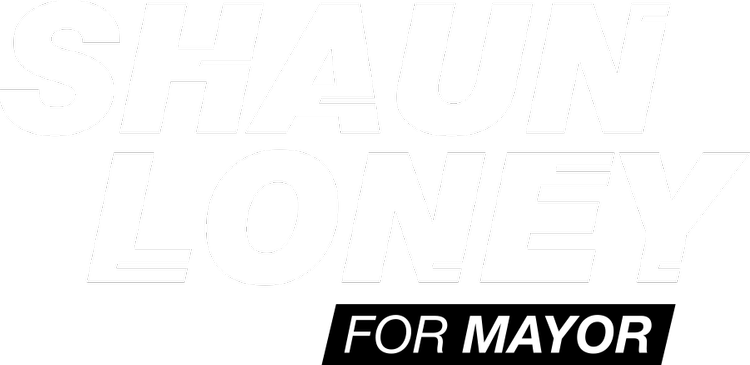Loney Announces ‘Smart Tax Task Force’
Top Ten Ideas to Make Taxes Work Better
Released July 25, 2022
WINNIPEG, Manitoba – Mayoralty candidate Shaun Loney says his ‘Smart Tax Task Force’ of business leaders would develop innovative approaches to taxes, fees and other municipal tools to help take Winnipeg to the next level and make it a leader on economic, social and environmental reforms.
Loney and his team of researchers and veteran government and business leaders have compiled a Top Ten list that re-think taxes, fees and tools for consideration by the Task Force:
Top Ten Smart Taxes and Tools:
Phase out the civic business tax, blend it in with commercial property taxes.
Introduce commercial parking tax to encourage using the land for higher value.
Create financing plan to support clean energy tools like heat pumps.
Improve development, building and permitting processes.
Fast-track permits for projects that reduce or eliminate carbon emissions.
Reward employers who help staff to convert carpooling, busing, biking or walking.
Encourage electrification of private vehicles fleets by financing charging infrastructure.
Incentivize diversion of organic matter going into the landfill to decrease GHG emissions.
Reward business that plant trees and/or install permeated pavement and other green infrastructure to reduce excess stormwater entering the public sewer system.
Incentivize businesses that promote local economic development with complementary currencies.
(see more details in Backgrounder)
“City Hall has acted as though our carbon emissions are just another problem rather than seeing it as an opportunity,” said Loney. “Using new tools like what the ‘Smart Tax Task Force’ will recommend, we can see that creating green jobs is the greatest economic opportunity available to us in a lifetime.”
The Loney team looked at examples around Canada and took into consideration the City of Winnipeg’s recently released Community Energy Investment Roadmap that says 100,000+ person years of employment is possible in a green economy. And it took into consideration the Winnipeg Chamber of Commerce’s recently released Civic Election 2022 Performance Playbook.
Loney is a former Director of Energy Policy for Manitoba. He has co-founded five successful social enterprises headquartered in Winnipeg. They include BUILD, winner of ScotiaBank’s EcoLiving Canadian Business Leadership Award and Aki Energy which has installed $15-million worth of heat pumps on Manitoba First Nations and recent winner of Canada Clean50 distinction.
“We need to use all available tools to get where we need to go. We have an unprecedented opportunity to accelerate the pace of positive change,” said Loney.
Loney gave an example of permit applications for two equal-sized new commercial buildings. One would be heated and cooled with a geothermal heat pump to minimize greenhouse gas emissions; use permeable pavement and landscaping features to help keep stormwater run-off from overwhelming the public sewage system; provide convenient EV chargers plus secure bike parking for its employees and customers; and partner with a social enterprise to create construction jobs for people that would otherwise repeatedly interact with the Winnipeg Police Service. The second building project would do none of these.
“Right now these two projects would receive equal tax treatment, pay similar fees and wait the same amount of time to acquire their permits,” said Loney. “We need to modernize our systems to reward the first business which is making a real effort to make the City better.”
“We also need new tools such as property assessed clean energy (PACE) financing to make it easy for businesses to cut their operating costs by installing heat pumps, EV charging equipment and doing deep energy retrofits,” said Loney.
Tina Jones, local entrepreneur and a member of the Manitoba Business Council who has seen the plan said that “Loney is a breath of fresh air. We need a Mayor who will implement real change.”
Wadood Imbrahim, past Chair of the Winnipeg Chamber of Commerce, said “Loney’s view of problems as opportunities is the kind of thinking and approach our city needs to achieve our potential.”
Loney said he will soon address other points in the Winnipeg Chamber of Commerce’s Playbook including downtown revitalization, promoting infill development, ramping up the social enterprise sector and ensuring the availability of more serviced land for development.
Backgrounder
Top Ten Smart Tax Ideas:
1. Simplify taxation and reduce administrative costs by phasing out the civic business tax and replacing the lost revenue by blending it in with commercial property taxes as has been done in most other major Canadian cities.
2. Reform parking including:
- introducing a tax on commercial parking to encourage the conversion of underutilized surface parking into higher value uses;
- expanding the exemption for parking minimums; and
- introducing dynamic parking rates for metered, on-street parking.
3. Enable installation of cost-saving heat pumps, solar systems and deep energy retrofits at no upfront cost by offering Property Assessed Clean Energy (PACE) financing.
4. Decreasing wait times and reducing permitting costs by dedicating revenue collected through development and permit fees to enable better processes and, if needed, more staff.
5. Fast-track permits for projects that target net zero emissions.
6. Reward employers who work with their staff to convert from driving to work to carpooling, taking the bus biking or walking – see Loney’s MetroMobility announcement.
7. Enable the electrification of private vehicles fleets by financing charging infrastructure.
8. Incentivize diversion of organic matter going into the landfill to decrease GHG emissions.
9. Use trees, permeated pavement, rain sharrows and other green infrastructure to reduce excess stormwater from entering the public sewer system – see Loney’s Natural Infrastructure announcement.
10. Incentivize businesses that promote local economic development by offering, for example, the Local Frequency Card to keep dollars circulating in local businesses.
References
City of Winnipeg Community Energy Investment Roadmap.Sustainability Solution Group. June 2017.
Environmental Tax Shifting in Canada: Theory and Application.Pembina Institute. March 2003.
Property Assessed Clean Energy in Canada.Pembina Institute. June 2020.
